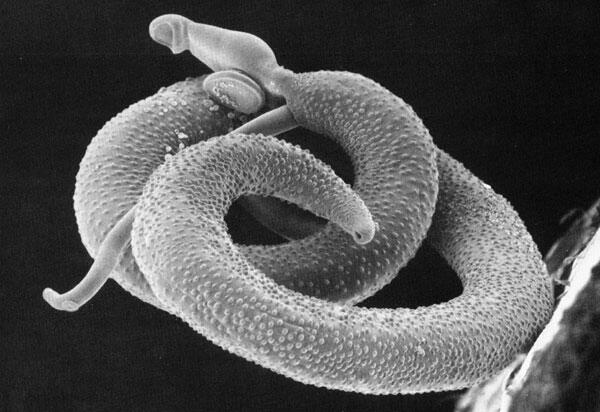
Professor Karl Hoffmann of Aberystwyth University was introduced by LSTM’s Head of Parasitology Professor Mark Taylor to an audience of over 30 members of LSTM staff and students, and gave a seminar entitled Aberystwyth Anthelmintic Drug Discovery: Seven years of steady progress.
He began his talk by explaining that parasitic worms cause some of the most debilitating and chronic infectious diseases of human and animal populations globally. The treatment of affected individuals is complicated by the limited drug classes available and the lack of effective vaccines to induce protective immunity. As a consequence, experimental approaches to identify novel and effective anthelmintics are urgently needed. Acknowledging this need and utilising both hypothesis-led and discovery driven research approaches, Professor Hoffmann and his team have worked towards developing new strategies for controlling parasitic helminths of biomedical importance.
His group and collaborators have focused their efforts on Schistosoma mansoni and Fasciola hepatica, the trematode worm species responsible for the Neglected Tropical Diseases
(NTDs) schistosomiasis and fascioliasis which cause significant blight globally. More than 200 million people suffer from the chronic and debilitating disease schistosomiasis following exposure to infested water, with the heaviest burden of disease affecting the most vulnerable poverty-stricken areas of sub-Saharan Africa, whilst fascioliasis causes significant losses in animal productivity worldwide. Professor Hoffmann continued by describing the issues surrounding current treatments for schistosomiasis and fascioliasis (Praziquantel and Triclabendazole, respectively) including their unknown mechanism of action, the requirement for repetitive treatments in endemic communities and concerns over the development of drug resistance. These challenges have contributed to the need for new chemotherapeutic agents or an effective prophylactic vaccine for helminth infections.
Professor Hoffmann described how his group have looked to other disciplines to identify the next generation of anthelminthics, most notably the disciplines of helminth developmental biology, epigenetics and gene regulation. Utilising this interdisciplinary approach, they focused on target-based drug discovery pipelines, utilised diverse compound libraries and drugs which have already been tested against other diseases such as cancer to potentially speed up drug discovery.
Professor Hoffmann concluded by saying that this cross-disciplinary approach is essential for the discovery of effective and potent drugs to enable tremendous strides to be made against diseases such as schistosomiasis and fascioliasis which affect some of the most disadvantaged populations worldwide.